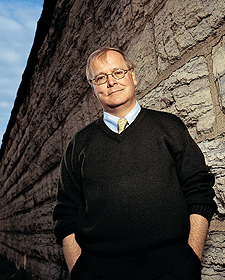|
Ministering Angel // Rev. Thomas J. Behrens // The Night Ministry
In 1976, Tom Behrens, then 30, held a job as a mortgage banker. With graduate degrees from the McCormick Theological Seminary and the Jane Addams College of Social Work at the University of Illinois at Chicago, the Hinsdale native was not looking to strike it rich in real estate. Rather, he figured that an understanding of the local housing market might complement his interest in social outreach. As it turns out, that knowledge would prove useful one day as Behrens discovered his true calling. That same year, an interdenominational consortium of religious leaders hired him to walk the streets of Lake View and Old Town after dark. Wearing his clerical collar and working out of his car, he sought out addicts and barflies, streetwalkers and runaways. Mostly he offered to listen. “The Night Ministry started as a way to deal with loneliness and individual issues-from alcoholism and drug addiction to health problems,” Behrens says today. Thirty years later, with an annual budget of $5 million, the Night Ministry employs a staff of 60 people (assisted by another 400-plus volunteers) who provide health care, shelter, counseling, and other services to street people and at-risk youth. For Behrens, the organization’s president, these homeless teens are a special concern. “There was a 16-year-old runaway who was murdered in 1984,” he recalls. “I remember a police officer saying that the only people who look for homeless youth are people who want to abuse them. I thought, there needs to be some sort of place that rescues them.” That’s where his background in real estate came in handy. In 1986, Behrens helped change a state law that had forbidden nonprofits to open group shelters for homeless youth. The Night Ministry opened a homeless teen shelter six years later; in 2006, its 16-bed facility provided housing for 178 people between the ages of 14 and 20, as well as for 21 of their children. These young people can stay for up to 120 days in the shelter, where they receive a bed, three meals a day, medical care, and counseling to help them find permanent housing and achieve financial independence, often by returning to school. In August 2006, the Night Ministry opened a second shelter in West Town. Since 1989, the Night Ministry has also been operating a Health Outreach Bus, and in 2005 it put a brand-new model into service. Each week the bus visits six different Chicago neighborhoods, from Wicker Park to Woodlawn, providing a wide array of services, from counseling to treatment for diabetes, hypertension, and a variety of common ailments. On one cold Friday night in Uptown this past fall, it provided a couple and their little girl with a warm meal and a pair of gloves; referred an abused female to a women’s shelter; and directed an HIV-positive man to the onboard nurse practitioner. Between its shelters, buses and vans, and other services, the Night Ministry intervenes in the lives of thousands of Chicagoans a year. Ultimately, Behrens wants every person who encounters the organization to leave feeling less alone in the world. “Loneliness is worse than hunger,” he says. “Too many people feel like they’re not worth a lot. I always want them to feel like they have dignity.” |
|||



